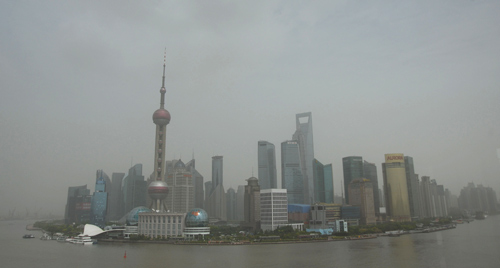|
 |
|
A GREY SKY: Smog covers the Lujiazui Finance and Trade Zone in Shanghai on May 3, 2011 (NIU YIXIN) |
Although tighter monitoring standards will soon be introduced nationwide, it will not be easy for Beijing and other cities to meet accepted PM2.5 standards and then further control pollution.
Technically, it is not difficult to monitor PM2.5 as it is similar to monitoring PM10, said Zhu Jianping, Deputy Director of the MEP's Department of Environmental Monitoring.
However, the biggest problem is financing. PM2.5 monitoring equipment usually costs 80,000-380,000 yuan ($12,710-60,370). A preliminary estimate shows that more than 338 prefecture-level cities will have to invest more than 2 billion yuan ($318 million) on the new equipment, Zhu said.
"Following the introduction of the new gauge, the number of reported good weather days will likely decrease. However, the figures will not be shameful as long as a real effort is being made to improve the situation," said Xu Ming, Vice Governor of east China's Jiangsu Province.
"Reducing air pollution in China during its current development phase is a massive systematic project," said Hao Jiming, Director of the Institute of Environmental Sciences and Engineering at Tsinghua University. He predicted that it would take at least 10 years for Beijing to meet the national standards currently established under the PM2.5 gauge.
Wu Dui, a researcher at the Tropical Oceanic Climate Institute of the China Meteorological Administration, suggested that local governments need stronger incentives to aggressively tackle air pollution. "The performance criteria for local governments should be broadened to include hard environmental targets, not just GDP," he said.
Currently, there is only one PM2.5 monitoring station in Beijing, but the EPB plans to build a citywide network of more than 30 stations by the end of this year, as this will allow it to release real-time PM2.5 data.
"The monitoring stations will turn into nothing but a decoration if they cannot objectively reflect air pollution and contamination," said Wang Qiuxia, a researcher at Green Beagle, a non-governmental environmental organization in Beijing.
The EPB said the capital would locate the stations in accordance with general international practices. "The stations will be located selectively, neither around the cleanest nor most polluted areas," Yu said.
According to existing national standards, a monitoring location should be 50 meters away from a pollution source, including automobile exhaust.
Meanwhile, the Beijing Municipal Government has also laid down a series of measures that will tighten controls on air pollution in the city.
According to a public spending budget released by the Beijing Municipal Finance Bureau in January, the municipal government will allocate 2.1 billion yuan ($334 million) to tackle air pollution and cover other work related to energy conservation and emissions reduction.
"Starting in March, the city will begin planting trees on 13,333 hectares of land between its fifth and sixth ring roads," said Vice Mayor Chen Gang at the annual session of the Beijing Municipal People's Congress, the local legislature, in January.
A number of currently desolate areas will be used for the forestation project, which by 2014 is expected to cover 66,667 hectares.
Besides the ambitious forestation plan, Beijing will also introduce more stringent emission standards, improve fuel oil quality, strengthen the control of dust in construction sites and further cooperate with neighboring cities.
This year, 150,000 old cars that cause heavy air pollution will be recycled and coal-fired boilers will be replaced with clean energy heating.
On January 4, Beijing introduced draft regulations on new standards for gasoline and diesel in the city. The move is intended to improve fuel quality, especially by reducing the sulfur content in gasoline.
"Reducing the sulfur content in gasoline means less sulfur dioxide in vehicle exhaust emissions, which is responsible for acid rain as well as a major contributor to PM2.5," said Zhang Yuanxun, a professor at the Chinese Academy of Sciences.
Furthermore, a primary target has been set to introduce Euro V emission standards for exhaust emissions of new vehicles to replace the current Euro IV standards by the end of this year, pressuring automakers to upgrade their products to reduce emissions
"There are 5 million motor vehicles in Beijing," said Yu Jianhua, Director of the EPB's Air Pollution Control Division. "In congested cities, the incomplete combustion of fuel leads to a tremendous increase in the density of PM2.5."
Du Shaozhong, Deputy Director of the EPB, said that cooperation between Beijing and neighboring cities is significant to tackling the city's environmental problems.
"We should collaborate with neighboring cities, such as Tianjin and Langfang in Hebei Province, to solve the problem," Du said.
Email us at: yinpumin@bjreview.com | 